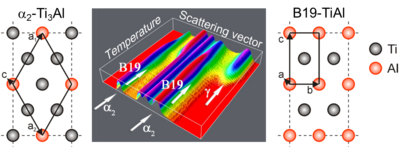Next (Neutron and X-ray Team)
Phase transformations in solid-state metallic and intermetallic high-temperature materials are an important field of research in experimental and theoretical materials science. High-performance multi-phase materials systems exhibit a wide range of phase transitions, which are used for the adjustment of optimized microstructures and properties. However, only a fundamental understanding of the mechanisms underlying the phase transformations imparts knowledge, whereon the applied research can build on and moreover opens up new opportunities for technical innovations.
Experimental methods of investigating phase equilibria and phase transformations by means of quenching and deformation dilatometry as well as differential scanning calorimetry. Phase characterization studies using scanning electron microscopy, electron backscatter diffraction and transmission electron microscopy. Besides these well-established methods also complementary techniques are used, such as in-situ diffraction investigations with neutron and synchrotron X-ray radiation working on the beamlines at ILL (Institute Laue-Langevin), Bragg-Institute (ANSTO) and Helmholtz-Zentrum Geesthacht at the German Electron Synchrotron (DESY).
The ongoing research projects in this field of work are arranged in such a way as to deepen the understanding of the material due to the obtained results and to provide new materials with improved properties. As an example, one project deals with the development of high-temperature light-weight materials such as Titanium-Aluminum-alloys for the application in automotive and aero-engines. To tap the full potential of this material class, an appropriate alloy composition along with innovative production and processing technologies have to be developed. Due to the fact that these projects belong to applied research with a strong focus on fundamental research, it is possible to share the respective results and use synergy effects for further improvements.

